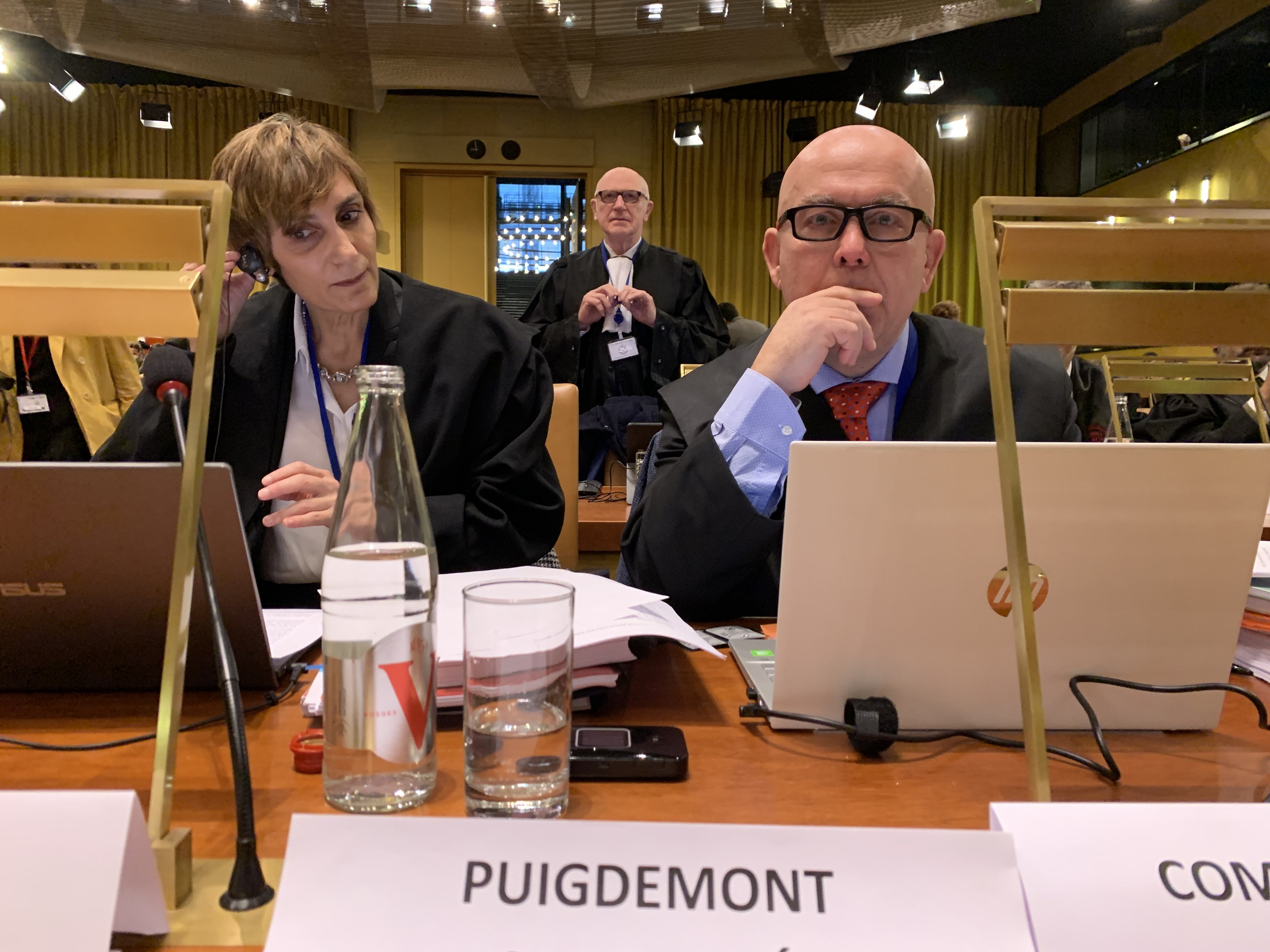Defence lawyer Gonzalo Boye has today called on the European Court of Justice (ECJ) to put an end to the persecution of the Catalan pro-independence politicians in exile in Europe. The lawyer appeared in defence of four of the former members of the Catalan government, Carles Puigdemont, Toni Comín, Clara Ponsatí and Lluís Puig, at the hearing held in the Grand Chamber of the ECJ on the preliminary questions presented by Spanish judge Pablo Llarena following Belgium's refusal to execute the European Arrest Warrant (EAW) against Lluís Puig. "It has gone on long enough, this persecution for having called a referendum," he said.
Boye explained that the Catalan politicians who went into European exile in 2017 are being persecuted under an "absolutely disproportionate action" from the Spanish judiciary and he recalled that in 2005 the action of calling a referendum without state permission was eliminated as a crime from the Spanish Penal Code; he denounced that they were being politically persecuted and warned that many of their fundamental rights had been violated. "They have no guarantee of a fair trial. This must end, and it must end here," he asserted.
Puigdemont's lawyer was the first of the defence representatives to speak on behalf of the exiled pro-independence leaders during the long-awaited hearing on the preliminary questions raised by the Spanish Supreme Court judge Llarena. Before the defence lawyers, the Spanish prosecutor Fidel Cadena and the representative of far-right Spanish political party Vox, Marta Castro, also appeared.
Political convenience
Boye recalled the three European warrants issued against the exiled leaders over the past four years and accused the Spanish court of having made political use of the measure, "issuing them and withdrawing them according to the political convenience." In this regard, he stressed that judge Llarena himself had admitted avoiding asking for Puigdemont's arrest in January 2018 when he visited Denmark so as not to benefit him electorally.
The lawyer began his speech by recalling the path taken to reach today's hearing. "Those whom I am defending represent the Catalan national minority that exists in Spain and, as such, are the victims of a persecution, which is what has brought us to this point," he explained, immediately evoking the Catalan referendum on independence from Spain, held on 1st October 2017, and the violent police actions to disrupt it, as well as the sentence that the Supreme Court imposed on Catalan vice president Oriol Junqueras, 13 years' prison, and the nine-year sentence imposed on the speaker of the Parliament of Catalonia, Carme Forcadell.
Persecution of thousands of Catalans
In fact, the Supreme Court's verdict against the leaders of the independence process was referred by the lawyer as a demonstration beyond all doubt of the "serious and credible" risk of the existence of deficiencies that pose a risk to fundamental rights, which, beyond being systemic and widespread, as has already been claimed, also affect the pro-independence leaders and "thousands of Catalans persecuted for being supporters of the right to self-determination, who now number 3,000". "It is clear that a judicial enforcement authority can and must refuse the handover [of the wanted persons] when there is a serious risk. In this case, it is a certainty, as stated by the United Nations Working Group on Arbitrary Detention," he said.
Boye detailed, as he has repeatedly done, the rights that could be seen to be violated in terms of fundamental tenets, such as the right to be tried by the court predetermined by law and the presumption of innocence; he recalled the statements and gestures against the pro-independence leaders made by judges involved in the case, and the denial of the requests for recusal that were lodged against them. He also recalled the jurisprudence of the ECJ, which established that the reports of the United Nations Working Group on Arbitrary Detention are "reliable and accurate" and that, in fact, the Spanish state had taken part in previous reports.
Elbal: preliminary questions as cassation
After Boye, lawyer Isabel Elbal spoke on behalf of MEP Clara Ponsatí. Elbal criticized the fact that judge Llarena, in not obtaining the arrest of Catalan minister Puig, used the possibility of raising preliminary questions "as a sort of European cassation appeal" in order to obtain the extradition of the former minister of culture. The lawyer reproached that the jurisprudence of the Grand Chamber of the ECJ is that preliminary questions "should not be hypothetical in nature, as those of Llarena are."
Subsequently in today's hearing, lawyer Andreu van den Eynde spoke in defence of the Catalan politican Marta Rovira (ERC), exiled in Swtizerland since 2018, while lawyer Benet Salellas represented Anna Gabriel (CUP), also in Swiss exile since 2018.
Below, the scene in the Grand Chamber of the Euopean Court of Justice at the start of today's hearing.

